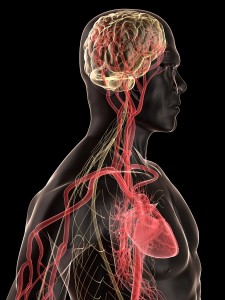Introduction
Here I am discussing that vitamin D3 benefits both heart and brain. Typically, what’s good for the heart is also good for the brain. This has been reconfirmed in two independent studies involving measurements of vitamin D3 levels (25-hydroxy vitamin D).
First study
- The first study was presented at the 63rd Annual Scientific Session of the American College of Cardiology, April 29-31, 2014. 1,484 subjects underwent coronary angiography to assess the blood flow through their coronary arteries, as they had symptoms of heart disease (angina or chest pain). An arterial diameter reduction by 50% or more is indicative of coronary artery disease. All of the subjects had their vitamin D blood levels measured as well. The definition of vitamin D3 deficiency was when the blood vitamin D level was 20 ng/ml or less. 70.4% of the subjects were vitamin D deficient. Some of them even had values of less than 10 ng/ml.
Low vitamin D blood levels lead to narrowing of the coronary arteries
Narrowing of the coronary arteries was found to be 32% higher in those with vitamin D3 deficiency. Those with severe vitamin D deficiency (less than 10 ng/ml) had twice as much coronary artery disease than those with less than 20 ng/ml of vitamin D or less.
Second study
- The second study comes from Health, Aging and Body Composition Study (Health ABC) at the Wake Forest Baptist Medical Center with the lead author Dr. Valerie Wilson. The study involved 2777 individuals age 70 to 79. Their cognitive function was well in the beginning of the study, which went on for 4 years. The researchers assessed cognitive function at the beginning of the study and after 4 years. One year into the study they also took vitamin D blood levels. 68% of the subjects had vitamin D levels that were less than 30 ng/ml.
Higher vitamin D levels associate with better cognitive tests
The researchers noted that there was an association between better cognitive test scores in the beginning of the study and higher vitamin D levels. A comparison of the test scores between the end of the study to the scores at the beginning showed that those with low initial levels of vitamin D had a much greater decline of cognitive function. Dr. Wilson said that vitamin D3 supplementation could have a huge positive effect on maintaining cognitive function in the elderly, as the majority of this population is deficient for vitamin D3.
When both of these studies are taken together, it is clear that vitamin D3 supplementation gives you a two for one deal; it is good for your heart and good for your brain!
More information
Heart disease: https://nethealthbook.com/cardiovascular-disease/
Vitamin D3 saves lives: https://nethealthbook.com/news/vitamin-d3-saves-lives/
References
1. American College of Cardiology’s 63rd Annual Scientific Session
2. J Am Geriatr Soc. 2014 Apr; 62(4):636-41.







